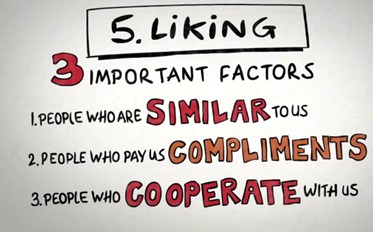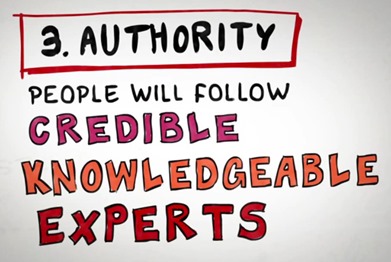Liking Authority and the Science of Persuasion

Likes UP! Like is such a popular word and has become the symbol of social approval and acceptance with the hand and thumb pointing up as in the Likes UP logo. This is the “find agreeable, enjoyable, or satisfactory” verb form of the word like.
“I like you.” Joe Girard is famous for using the statement, I like you, in his sales campaigns. And, “I like you,” was VERY effective.
Like has other definitions. Liking has been made famous by Robert Cialdini and it is his 5th principle of persuasion.
Liking. We like people who are similar, who give us compliments and who co-operate with us.
Match Liking with Authority and things shift higher –with a sharp increase or spike in activity.
Authority. We are more likely to comply with a request if it is coming from a perceived authority/expert. This is Cialdini’s 3rd principle of persuasion.
Authority by itself may trigger the negative reaction to reject of authority if it is perceived as someone giving orders or enforce obedience, but when it includes liking there is an attraction.
Author and authority are clearly the same root word. An author is broadly defined as “the person who originated or gave existence to anything” and whose authorship determines responsibility for what was created. Narrowly defined, an author is the originator of any written work and can also be described as a writer.
Typically, when someone calls themselves and author, they are referring to a book they have written. For example, as the author of the book, The Webinar Way, I invite people to go to Amazon where they can get a copy of the book and see all the reviews that show liking and consensus. The book illustrates that I speak as an authority on the subject of webinars.
As an authority you have the power to influence others, ideally in a positive way because of your commanding manner or recognized knowledge. There is a certain confidence with comes with authority. As a person with extensive or specialized knowledge about a subject you are an expert authority. Most important as an authority, you are a trusted, reliable source.
The original of the word author is from Middle English: from Old French autorite, from Latin auctoritas, from auctor ‘originator, promoter.’ So as an author or authority, you are promoting your expertise.
Here’s a quick refresher on the 6 Principles of Persuasion:
1. Reciprocity. We are obliged to give if we have been given something.
2. Scarcity. If it’s scarce, we want it more. Use this by highlighting the Benefits, Uniqueness and Possible Loss.
3. Authority. We are more likely to comply with a request if it is coming from a perceived authority/expert.
4. Consistency. We want to be consistent with our past commitments, even if the initial commitment is much smaller.
5. Liking. We like people who are similar, who give us compliments and who co-operate with us.
6. Consensus. If others (especially similar others) are doing it, then we are more likely to do it ourselves.






